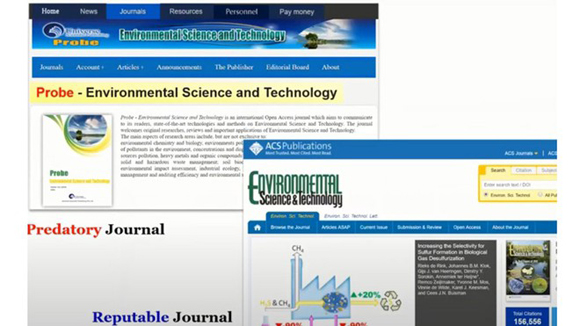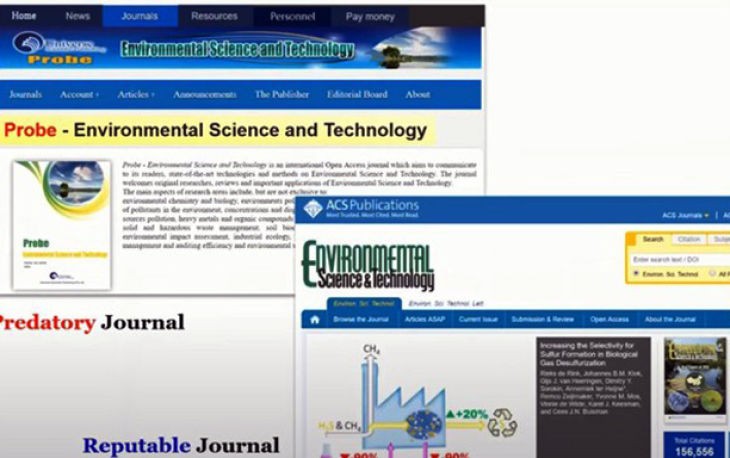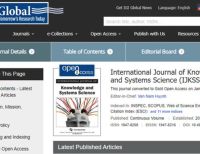
Two journals with almost identical names. In the picture on top a “fake” journal, in the other picture a journal of quality. SCREENSHOT
Journals “hunting” authors for profit
In June, the executive body of the National Foundation for Science &Technology Development (Nafosted) had a meeting with representatives of the science councils of the natural sciences and technology to discuss improving the quality of publications the Foundation finances in specialized international scientific journals. Many scientists spoke straightforwardly about identifying journals of poor quality and its impact on the quality of the Foundation’s research programs.
Very many researchers did not limit themselves to the discussion during the meeting and voiced their opinions and even held fierce debates on their personal pages about the quality of many research reports published in journals seen as “fake” or of poor quality. The scientists furthermore mentioned the “race for international publications” at several universities. This shows that the scientific community has questions about some international papers, and especially about papers published in for-profit and predatory journals.
“You can say that identifying those journals is very easy,” Assoc.Prof. Dr Nguyen Van Thuan, Dean of the Faculty of Biotechnology at the International University Ho Chi Minh City, said. “They usually email invitations and require payment of a fee before publication. I receive a great many such emails, with fees from two to three thousand US dollars. This is obviously some kind of business. They accept papers but never referee them, they only correct spelling mistakes. Nobody also reads the papers in those journals. There are currently hundreds of thousands such journals in the world.”
Dr Tran Nguyen Hai of the DTU Institute of Fundamental Science and Application in Ho Chi Minh City is of the opinion that “fake” journals and publishers are very numerous nowadays, are continuously founded, and always change their approaches to snare inexperienced researchers. ““Fake” journals demand you pay a fee and only want your money, and they don’t care about quality,” Dr Hai explains. “Signs that a journal is “fake” are continuous invitation emails, announcing fees to be paid, bare-bones information on the journal, ugly interface, fake editorial credentials, mentioning famous people without permission, indices that are fake as well, and accepting any paper sent for review. Those who publish a lot in these journals become addicted, because very quickly referees, if any are involved at all, praise more than they criticize.”
According to Dr Hai, scientists who fall for the traps and publish in those kinds of journals and then want to erase all trace of it and want their names and papers gone from the system are usually required to pay up even more money, often double the publication fee.
However, Assoc.Prof. Thuan explained, not all journals that require fees are “fake”. There are some genuine journals of quality, and researchers must have experience and insight.
Publishing to embellish applications
The scientists’ analysis came up with two reasons why many researchers submit their papers to journals of poor quality. First, because their papers are difficult to publish in prestigious journals, so they are forced to submit them to “fake” journals for a variety of objectives, such as embellishing applications for research funding, for promotion, or to meet the criteria to obtain a professorial title. This is why, even knowing the journal is bad, they still submit their papers to it.
The second reason is that the authors lack experience and insight in the journal. Such authors are usually research students. “In this case, to know whether the journal has prestige, the authors should ask for opinions and advice from their lecturers, scientists in the field, and other people with a lot of experience at researching, writing, publishing, and refereeing international papers in prestigious journals,” a Vietnamese PhD in the US advises. “The authors can furthermore use tools for a basic assessment of a journal suitable for their paper based on tools provided by prestigious publishers or Web of Science.”
Many prizes can do harm
Having studied and lectured in South Korea, Assoc.Prof. Dr Nguyen Van Thuan acknowledged that in the last ten to fifteen years, the country was in a similar situation, a race for quantity, after which they finally also started working on quality. And almost all countries in the world go through such a phase.
“Many universities don’t require quality,” Assoc.Prof. Dr Nguyen Van Thuan opines. “They accept even papers published in those mediocre journals. This is why quality, first of all, requires the gatekeepers, the ones leading the group, to have the mind and heart to discriminate and provide management.”
Giving “too big” prizes and considering the number of papers or the Q1, Q2, etc. ranking as some universities do nowadays also invisibly creates a trend of “producing papers for money” without much regard for research quality. After the meeting in June, the Nafosted executive body scientific council also called for scientists not to publish in bad quality journals. Meanwhile they will tighten procedures for assessment of submissions and of the actual results from project financed by the Foundation.
(Media Center)
For the last several years, many Vietnamese researchers have been obsessed with publishing in international journals. Alongside this, however, arose concern about the quality of more than a few of those publications.
















